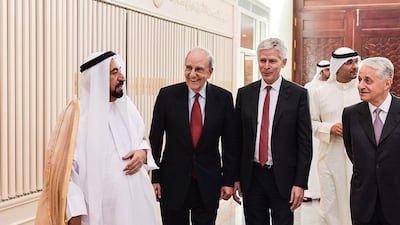In an interview in the UAE, George Mitchell, Washington’s former special envoy to the Middle East, discusses the “demographic bomb” in Palestine, the impasse over Iran’s nuclear programme and the Syrian civil war.
Q: Palestinian-Israeli peace talks are back on. What’s changed in the three years since you led the last attempt to get the two sides talking?
A: For the Israelis, a failure to get an agreement means they confront this demographic watershed where the number of Arabs in the space between the Jordan River and the Mediterranean exceeds the number of Jews and that is coming very quickly. It’s a certain result – it’s just a matter of when it occurs.
Q: What else?
A: We have a tendency throughout history to fight the last wars. The next war is not going to involve tanks crossing the border and marching armies behind them but rockets. And while the barrier that Israel built has reduced suicide bombing, as has the very active and aggressive policing of the West Bank by the Palestinian Authority, the real threat now comes from rockets.
Hamas now has an estimated 8,000, which although crude and lacking in guidance and destructive power, nonetheless create fear and anxiety. The published reports in Israel suggest Hizbollah has somewhere between 30,000 and 50,000, somewhat better than those of Hamas.
Iran has also made the technological leap from liquid fuel rockets to solid fuel rockets and they now have an arsenal that can reach anywhere in Israel launched from Iran itself.
The Palestinians confront serious problems as well. They have been 60 years without the dignity and self respect that comes from the right to exercise self governance.
What I said to [Yasser] Arafat many times, and [Mahmoud] Abbas, is that there is only one answer here. They have to get into a negotiation and stay in it until they get an agreement that creates a state. It will be less than 100 per cent of what they want but it will create a state that they can then build on.
Q: But are the conditions for achieving that outcome now more favourable now than three years ago?
A: You can argue it both ways. Those who don’t want to proceed cite the instability in the region as a reason not to do anything.
But look at the high value that Israel places in maintaining a treaty with Egypt, look at the high value that Israel places on maintaining a treaty with Jordan. Why wouldn’t a treaty with the Palestinians make as much sense as those treaties make? It doesn’t guarantee stability but it provides the opportunity for stability.
Q: Do you trust Bashar Al Assad when he says he will give up his chemical weapons?
A: I do not trust him. But I believe there will be a regimen in place to ensure that he complies with the instruction. I think it would be unwise in the extreme for him to now contemplate using such weapons again.
Q: We also see a renewed effort to resolve the Iranian nuclear standoff. What prospects for progress?
A: President [Hassan] Rouhani and the supreme leader, [Ayatollah Ali] Khamenei, have both said that Iran does not seek nuclear weapons. Unfortunately the actions of their government have been inconsistent with those statements.
Hopefully they will get the chance to bring their actions in line with the policies the president and supreme leader say are their policies of the government. When they do that we will all be better off - including the people of Iran. They are entitled to a nuclear programme and they are entitled to enrichment up to a certain level for and they say, medical research an private power.
They are not entitled to enrichment beyond that or seeking to develop or weaponise a nuclear warhead beyond that.
Q: How can policymakers in Washington get their arms around the discord and political upheaval that this region is presenting from Cairo to Damascus, the West bank to Tehran?
A: What we’re now seeing in this region is likely to continue perhaps for a long period of time. There’s a lot of impatience in the West. In the United States and in a much simpler time – a much simpler time – eight years elapsed between the ending of the fighting in the American Revolution and the establishment of our government. Revolution, counter-revolution takes a long time.
In this region particularly given the dramatic increase in population, a large part of the unrest comes from people not having jobs and opportunity. That’s no different in Cork, New York or my home state of Maine. Satisfying these needs is going to be very difficult and the dissatisfaction that ensues will probably mean a continuing period of instability for some time.
Senator George Mitchell is Chairman of DLA Piper and was Special Envoy for Middle East peace between 2009 and 2011. A former Senate Majority Leader, he was also one of the main architects of the 1998 Good Friday Agreement.
scronin@thenational.ae

